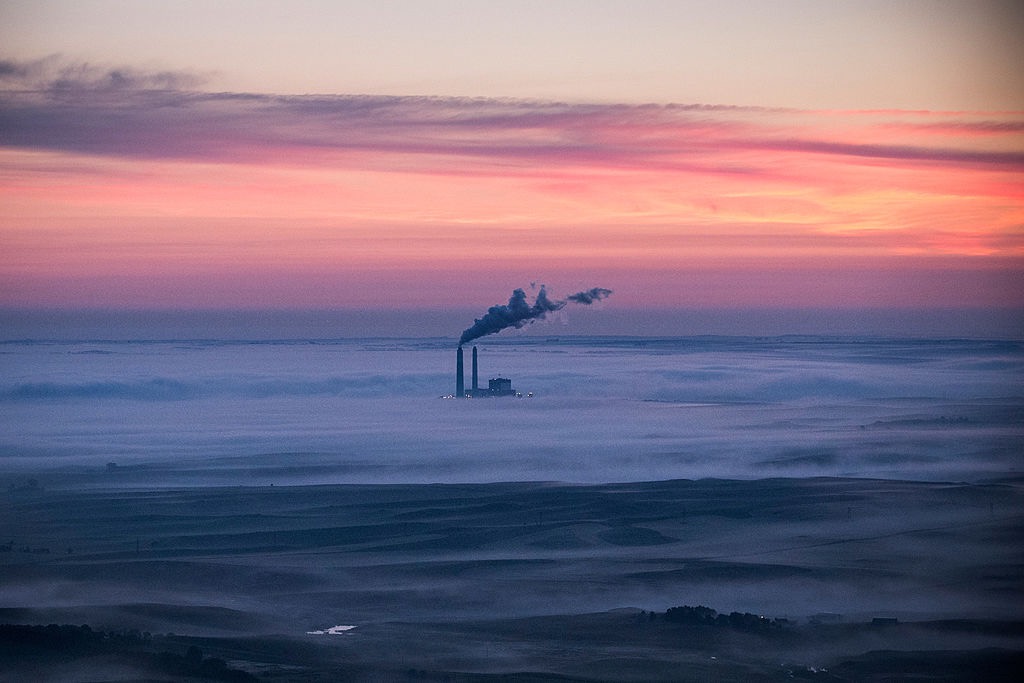Life Without the EPA: Superfund Apartments and Acid Rain

Get the world’s most fascinating discoveries delivered straight to your inbox.
You are now subscribed
Your newsletter sign-up was successful
Want to add more newsletters?

Delivered Daily
Daily Newsletter
Sign up for the latest discoveries, groundbreaking research and fascinating breakthroughs that impact you and the wider world direct to your inbox.

Once a week
Life's Little Mysteries
Feed your curiosity with an exclusive mystery every week, solved with science and delivered direct to your inbox before it's seen anywhere else.

Once a week
How It Works
Sign up to our free science & technology newsletter for your weekly fix of fascinating articles, quick quizzes, amazing images, and more

Delivered daily
Space.com Newsletter
Breaking space news, the latest updates on rocket launches, skywatching events and more!

Once a month
Watch This Space
Sign up to our monthly entertainment newsletter to keep up with all our coverage of the latest sci-fi and space movies, tv shows, games and books.

Once a week
Night Sky This Week
Discover this week's must-see night sky events, moon phases, and stunning astrophotos. Sign up for our skywatching newsletter and explore the universe with us!
Join the club
Get full access to premium articles, exclusive features and a growing list of member rewards.
Acid rain devouring New England forests. Homes built on toxic sites. Unswimmable rivers and cities cloaked in smog. The United States looked very different before the Environmental Protection Agency (EPA) arrived, but a recent Congressional bill calls for the agency's abolition. So Americans may wonder: What would life be like without the EPA?
In its 47 years of operation, the EPA has achieved dramatic improvements in the cleanliness of the nation's air and water, among other accomplishments, said Sara Gregg, an associate professor of history and environmental studies at the University of Kansas. To accomplish this, however, the agency has imposed numerous regulations on industry, making itself a frequent target of critics. Last month, Congressman Matt Gaetz, R-Florida, gave those criticisms stark expression in a bill calling for the agency's abolition on Dec. 31, 2018.
In an email to fellow representatives about the bill, Rep. Gaetz said, "The American people are drowning in rules and regulation," the New York Daily News reported. "And the Environmental Protection Agency has become an extraordinary offender." (The congressman's office did not respond to a request for comment.) [10 Ways the EPA Has Protected Earth and You]
President Donald Trump similarly suggested abolishing the agency during the presidential campaign, and his administration has proposed cutting the EPA's staff by one-fifth and its budget by 25 percent, The Washington Post reported.
Life without the EPA
These proposals ignore the reasons the agency was created, said James Salzman, a professor of environmental law at the University of California, Santa Barbara. Removing federal oversight and entrusting environmental regulation solely to the states would return the country to a failed status quo, Salzman said.
"We've been there. It was called the 1960s, and it didn't work very well," he said.
Before the EPA's establishment in 1970, the country experienced a series of environmental crises, Gregg said. Famously, the Cuyahoga River in Ohio caught fire — multiple times — due to pollution. Acid rain was destroying New England forests. The 1972 Federal water pollution control act amendment declared that the nation's rivers and streams were not fishable or swimmable, and must be cleaned up by 1982, Gregg said.
Get the world’s most fascinating discoveries delivered straight to your inbox.
"Congress acknowledged … that it was not safe to put your body into the water," she said.
Archived pictures from the 1960s and 1970s show how bad the air had gotten, with New York covered in smog, Gregg added. Louisville, Kentucky, too, wore a shroud of smog like those that cloak cities like New Delhi and Beijing today, reported Popular Science.
"I think about … the photographs that show oil spills that were unaddressed, or the products of tanneries or lumberyards or paper production that flowed into the rivers and lakes and streams of the nation," Gregg said. "I think about … factories spewing a range of chemicals that nobody actually understood." [The 10 Worst Oil Spills]
Pollution knows no boundaries
The EPA, in conjunction with legislation like the Clean Water Act and Clean Air Act, addressed those catastrophes by various means, such as requiring scrubbers in coal-fired power plants and regulating the dumping of chemicals.
In doing so, the EPA accomplished what the states themselves couldn't, Salzman said. Because pollution has no respect for political boundaries, a federal agency was needed, he said. That acid rain eating its way through New England trees, for example, came from pollution spewed by Midwestern coal plants. [In Photos: The World's 10 Most Polluted Places on Earth]
"For a variety of reasons, states were just not willing to make the tough decisions to dramatically reduce pollution," Salzman said.
The EPA, however, not only consolidated various agencies and efforts related to environmental protection, but also recognized the flow of pollution across spaces, Gregg said.
"And I can't quite wrap my mind around the idea that somehow [this flow of pollution] can be overcome by the abolition of a national-level agency," she said.
Success stories
Today, the EPA's work has continued to transform the country, Salzman said.
"The results have been extraordinary, by any measure," he said. "Our air is cleaner to breathe. ... Our waters are much cleaner. Our hazardous waste is much more safely treated and managed. And this has led to direct benefits in public health that, when quantified, are worth many billions of dollars."
Air quality, in particular, represents an enormous environmental-health achievement, said Tracey Holloway, a professor of environmental studies at the University of Wisconsin-Madison.
"A lot of people don't realize that air pollution in the United States is a success story," she said. "We have some of the healthiest air in the world, especially considering that we use more energy than anywhere else." [5 Ways Climate Change Will Affect Your Health]
This has meant longer lives and fewer cases of asthma attacks and respiratory diseases, she said. Since the enactment of the Clean Air Act amendments of 1990 alone, pollution reductions avoided 160,000 premature deaths; 130,000 heart attacks; and millions of cases of respiratory problems, a 2011 EPA study estimated.
The agency's work has led to similar improvements in water quality, Salzman said. Other EPA efforts include the study of industrial chemicals' health effects; the Superfund program, which allows for the cleanup and emergency evacuation of toxic sites; and the administration of the popular Energy Star program, which certifies energy-efficient appliances for consumers.
Looking ahead
Rep. Gaetz's bill, of course, would not travel back in time and prevent the EPA's birth. So would abolishing the EPA now immediately return the U.S. to the 1960s? That's unlikely, Gregg said, because the nation's industries have "internalized the understanding that pollution does not pay in the United States.
"It's not as though retrofitted coal plants would pare out their scrubbers, which they've invested millions of dollars in," she said. "It just doesn't work that way."
In the long term, though, conditions will degrade as new production facilities come online without regulations, she said. And some 2,000 or so new industrial substances would arrive every year without any understanding of their health risks, Popular Science reported. The country and the agency, too, still have work to do on understanding and combating pollution, particularly for ozone and particulate matter, according to a 2014 NASA report on air quality.
And without the EPA's abilities to quickly assess environmental hazards, future environmental disasters would be worsened, The Washington Post reported. A proposed 42-percent budget cut to the EPA's research division already makes that a danger, the Post reported.
Abolition coming?
In the end, the EPA is unlikely to face flat-out abolition, Salzman said, because all federal environmental legislation assumes the existence of the EPA for enforcement. So eliminating the agency would require rolling back those laws, too, which is unlikely, he said.
"It's hard for me to imagine that there would be public support to rewrite all of our major environmental laws," he said.
Budget cuts, however, and efforts to return regulation to the states, are very real possibilities, Gregg said. Long-established efforts, like those mandated by the Clean Water Act, should be more resistant to proposed cuts, but newer programs, like environmental-justice efforts could disappear, she said. (These efforts aim to make environmental protection equitable for all people, according to the EPA.) Radon testing, lead cleanup and industrial-site cleanup are also at risk, Grist magazine reported.
Gaetz's bill still stands as a symbolic criticism, representing charges that the agency stifles the economy, though research doesn't support that idea, Salzman said. The economic benefits of the 1990 clean air amendments, for example, would outpace losses by a factor of 30 by 2020, the 2011 EPA study estimated.
"The EPA was created to protect the environment for all of us, not to kill jobs," Salzman said. "And they don't kill jobs, on balance."
Follow Michael Dhar @michaeldhar. Follow us @livescience, Facebook& Google+. Original article on Live Science.

Michael Dhar is a science editor and writer based in Chicago. He has an MS in bioinformatics from NYU Tandon School of Engineering, an MA in English literature from Columbia University and a BA in English from the University of Iowa. He has written about health and science for Live Science, Scientific American, Space.com, The Fix, Earth.com and others and has edited for the American Medical Association and other organizations.
 Live Science Plus
Live Science Plus










